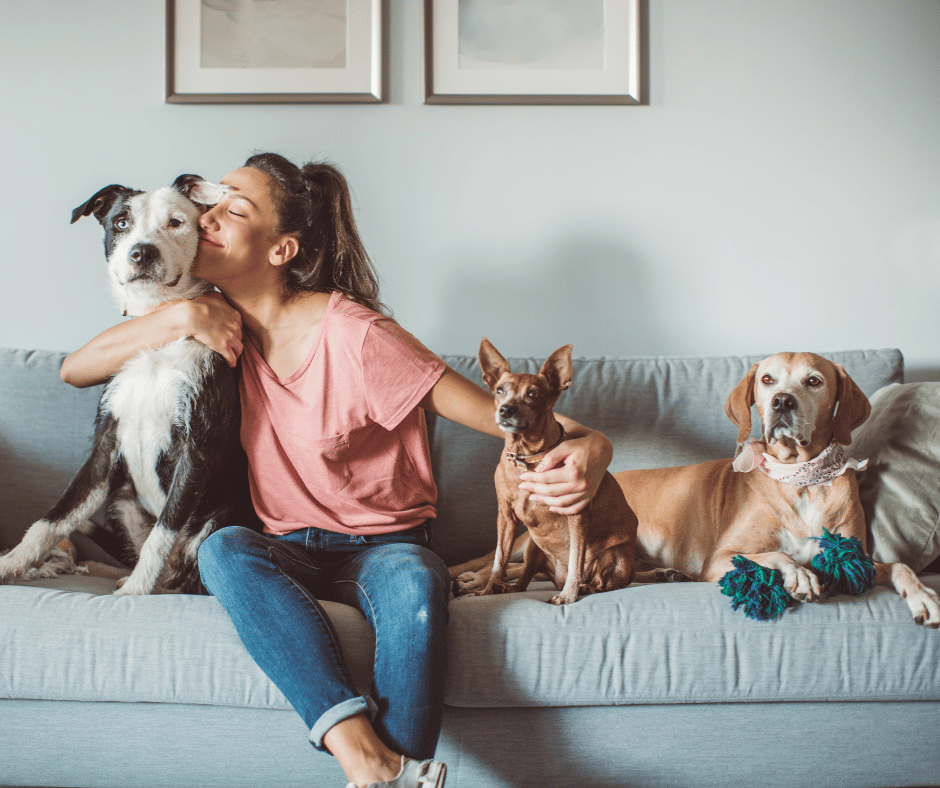Getting a new pet dog is a big deal, especially if you’ve never owned a dog before.
There are loads of reasons why you might want to get a pet dog: They provide companionship, they help with anxiety, they help with depression, and they provide physical exercise.
They can also teach children how to behave and how to interact with others.
In this article, we’ll take a look at the benefits of getting a pet dog, as well as the things you should consider before bringing home a dog to become part of your family.
Whilst we love our furry friends – owning a dog isn’t for everyone!
Ps if you’ve already got a dog, and are looking to get a new puppy – check out our guide to introducing your new puppy to your dog!
Table of Contents
- Things To Think About Before Getting a Dog
- Will a dog fit with my lifestyle?
- How Much Will It Cost To Own A Dog?
- Top Things Dog Owners Have To Deal With
- Do I Have Enough Space For A Dog?
- Should I Get A Puppy Or An Adult Dog?
- Purebred dog versus a mixed breed dog – which should you get?
- So, should you get a pet dog or not?
Things To Think About Before Getting a Dog
There are quite a few things to know before getting a dog, like do you actually have the time and space for a new furry friend. Dog ownership isn’t necessarily the easiest thing you can do!
Dogs need plenty of exercise (which means so do you!), so if you live in an apartment or have a busy lifestyle, a dog may not be the best fit. Many people underestimate the impact on their daily routine a dog can have, so make sure you’re ready for that before adding one to the mix.
Dogs need to be trained in order to learn how to behave, and this takes time and effort. If this isn’t something you’re willing to do, then a dog may not be for you.
Bear in mind that some breeds of dogs are more active than others, and if you’re looking for a lapdog then a soft-coated dog may not be the best choice.

Will a dog fit with my lifestyle?
As we mentioned above, dogs need exercise (and the larger the dog, the more they need) so you need to ask yourself: Do you have enough time to walk and play with them every day?
Ideally a dog requires walking twice a day, but if you only have time for one walk a day, make sure that it’s the morning or afternoon.
Unlike cats, dogs don’t like being by themselves for long periods of time, so you need to think about how long you spend out of your home each day – and if you have the opportunity to be at home more.
Since the various lockdowns across the world, more and more people are finding that they can work from home on a regular basis. If you’re one of them, then you might find it easier to adapt your daily routine.
The bottom line is, if you’re always working away from home, have a busy social life and do hobbies that take you away from the home on a regular basis – maybe a dog isn’t a good choice for you as you just wont have the time to care for a dog.
How Much Will It Cost To Own A Dog?
When it comes to costs, buying or adopting a dog is only the beginning.
Dogs have to have regular medical care, like vaccinations, regular checkups, and routine veterinary tests.
If you’ve got a pup, then you may wish to neuter them, and this is actually pretty costly. As an very rough average, budget for this costing around $300.
Vaccinations help keep your dog from getting sick, and regular tests can help you spot health problems before they get too bad.
The American Kennel Club says that you’ll be looking at an average of around $100 for a puppy’s 1st year vaccinations.
Checkups are important to make sure your dog is healthy and to find any problems before they get worse.
And food….dogs like to eat…a LOT. And of course the bigger the dog, the bigger their appetite.
According to a survey from Statista, people in the USA spend an average of $440 a year on dog food.
Pet insurance for dogs is recommended to help offset unexpected vet bills. A recent article from valuepenguin.com has the average cost for dog insurance at around $30-$50 a month,
So lets add that up:
- $100 – 1st year vaccines
- $300 – neutering (optional)
- $440 – dog food
- $600 – per insurance (average)
- $200 – toys, beds etc
So the cost of a dog comes in around a total of $1340 a year – or $1640 to include neutering.
Of course you might have other costs, like if you employ a dog walker, or need to take your dog to a kennel when you go away on holiday. You also might decide you want to groom your dog professionally (saves you getting wet….).
It all sounds like a lot – but our furry friends are totally worth it! 😀
Top Things Dog Owners Have To Deal With
Owning a dog comes with a lot of responsibilities – from feeding and walking them, to making sure they have enough socialisation and exercise. However, it’s not all doom and gloom – dogs can bring a lot of joy into our lives.
But before you take the plunge, it’s important to be aware of some of the most common issues dog owners have to deal with.
Here is a quick list of things to consider consider before getting a dog:
1. Dog poop – It might not seem like a big deal, but housebreaking a dog can be a huge pain. Many owners find that their dog simply doesn’t understand when it’s time to go outside.
2. Boredom – Just because your dog is house trained doesn’t mean they’re always entertained. Getting them some toys, playing with them regularly, and providing enough stimulation (outside of their food) can help keep them engaged and happy.
3. Training – A well-trained dog is a joy to have, but it takes time and effort to teach them the rules of the household. From basic obedience commands to more complex tasks like learning how to stay away from dangerous objects, having the right training can make life a lot easier for both you and your furry friend.
4. Conflict – Just because your dog is obedient doesn’t mean there won’t be times when they don’t get along with other members of the family. In some cases, dogs might be territorial or aggressive. Learning to deal with these conflicts before they get out of hand is a crucial part of owning a dog.
Do I Have Enough Space For A Dog?
Some dogs need more space than others, and some breeds are better suited for small spaces than other types of dog.
If you have a small space, it might be best to get a dog that is not as territorial or aggressive. In this case, you might want to think about breeds like Poodles, Shih Tzus, or Spaniels.
On the other hand, if you have more space, it might be a good idea to get a larger dog that is more active. If you’re looking for a larger breed that can make the most of your space, then you should think about getting a Bulldog, German Shepherd, or Rottweiler.
Bottom line – not matter how small (or large!) your living space, there is a dog that’s a perfect fit for you 🙂

Should I Get A Puppy Or An Adult Dog?
Honestly, there’s no right answer to this, at the end of the day only you can make the decision, but if you have decided that you’re ready for a dog, this is the next step 🙂
If you are looking for a lifetime companion, then getting a puppy may be the best option since you can train them and mould them into the dog that you want.
But bear in mind, puppies require a lot of time and energy, and they can be destructive – especially while you’re all getting used to each other.
People don’t call this pet parenting for nothing – a brand new puppy is almost as much work as a baby (hey, we said almost!).
If you are looking for a lower-maintenance option, then an adult dog may be a better choice. Adult dogs are typically already trained and have settled into their personalities.
However, it can be difficult to find an adult dog that is a perfect match for your family, but rescue shelters can be a great option (and hey, you’re doing some good by taking in a rescue dog!).
Purebred dog versus a mixed breed dog – which should you get?
Dog breeds are an important decision when getting a dog. Of course the following is just our opinion, but before deciding whether to get a purebred or mixed breed dog, you should think about a few different things.
Purebred dogs are typically more expensive, but you may be able to find one through a rescue organization.
Breeders will usually be happy to answer questions about specific breeds, including their behavioural traits, so don’t be shy to ask.
Cost aside, one issue often associated to pure breed dogs is that they may have more health issues. For example, some purebreds are prone to bone and joint problems, eye problems, and allergies.
On the other hand, mixed breed dogs may not always have the temperament that you’re looking for. If you’re looking for an obedient dog that will do everything you tell him/her, then a purebred might be the better option.
Mixed breed dogs are often healthier and have fewer genetic problems, but they may be harder to train.
Ultimately, the best pet for you will depend on your lifestyle and preferences.
So, should you get a pet dog or not?

Hopefully we’ve given you so good things to consider to help make you choice, but ultimately the decision is up to you!.
However, for what it’s worth – in our opinion….If you’re always away from home, have a busy social life, and do hobbies that take you away from the home on a regular basis, maybe a dog isn’t a good choice for you.
But, if you’re able to deal with the costs and responsibilities that come with owning a dog, they can be incredibly rewarding companions.





Leave a Reply